
Identities and Interests Race: Ethnicity, and Affinity Voting
The electoral behaviour of racialized voters and politicians has captured little attention outside the United States.
Identities and Interests offers an entirely new perspective on the role of racial and ethnic identities in Canadian elections. Randy Besco combines survey, candidate, and census data with a series of experiments to show that ethnic self-identification matters far more than self-interest, ideology, or policy. The largest minority groups – Chinese and South Asian Canadians – tend to support candidates of their own ethnicity. Yet inter-minority affinity voting also reveals the potential for “rainbow coalitions” and how minorities themselves think in terms of a white/non-white divide.
Identities and Interests gets to the heart of our understanding of democracy and citizenship. While identity politics are often considered problematic for democratic debate, Besco distinguishes between pure in-group bias and the positive effects stemming from affinity voting and calls for a more nuanced evaluation of the role of identity in politics. Overall, his findings have major implications for social movements, issue opinions, fundraising, and political leadership races.
In an age of increasing multiculturalism and rising racial tension, scholars and students of political science will find this book a compelling read, as will professionals working in the political sphere.

The Shifting Border: Legal Cartographies of Migration and Mobility
The border is one of the most urgent issues of our times. We tend to think of a border as a static line, but recent bordering techniques have broken away from the map, as governments have developed legal tools to limit the rights of migrants before and after they enter a country’s territory. The consequent detachment of state power from any fixed geographical marker has created a new paradigm: the shifting border, an adjustable legal construct untethered in space. This transformation upsets our assumptions about waning sovereignty, while also revealing the limits of the populist push toward border-fortification. At the same time, it presents a tremendous opportunity to rethink states’ responsibilities to migrants. This book proposes a new, functional approach to human mobility and access to membership in a world where borders, like people, have the capacity to move.

Business and Social Crisis in Africa
Much of the time, when confronted with a crisis of national dimensions, businesses do exactly what we expect them to do: they look to their own survival. Occasionally, however, firms in some contexts go beyond this. Based on qualitative, country-based fieldwork in Eastern and Southern Africa, Antoinette Handley examines how African businesses can be key responders to wider social and political crises, often responding well in advance of the state. She reveals the surprising ways in which business responses can be focused, not on short-term profits, but instead on ways that assist society in resolving that crisis in the long term. Taking African businesses in Kenya, Uganda, Botswana and South Africa as case studies, this detailed exploration of the private sector response to crises, including HIV/AIDS and political violence crises, introduces the concept of relative business autonomy, exploring the conditions under which it can emerge and develop, when and how it may decline, and how it might contribute to a higher level of overall societal resilience.
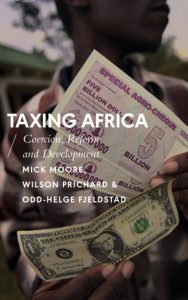
Taxing Africa: Coercion, Reform, and Development
Taxation has been seen as the domain of charisma-free accountants, lawyers and number crunchers – an unlikely place to encounter big societal questions about democracy, equity or good governance. Yet it is exactly these issues that pervade conversations about taxation among policymakers, tax collectors, civil society activists, journalists and foreign aid donors in Africa today. Tax has become viewed as central to African development.
Written by leading international experts, Taxing Africa offers a cutting-edge analysis on all aspects of the continent’s tax regime, displaying the crucial role such arrangements have on attempts to create social justice and push economic advancement. From tax evasion by multinational corporations and African elites to how ordinary people navigate complex webs of ‘informal’ local taxation, the book examines the potential for reform, and how space might be created for enabling locally-led strategies.

Indigenous Empowerment through Co-management – Land Claims Boards, Wildlife Management, and Environmental Regulation
Co-management boards, established under comprehensive land claims agreements with Indigenous peoples, have become key players in land-use planning, wildlife management, and environmental regulation across Canada’s North. This book provides a detailed account of the operation and effectiveness of these new forms of federalism in order to address a central question: Have co-management boards been successful in ensuring substantial Indigenous involvement in policies affecting the land and wildlife in their traditional territories?
Graham White tackles this question, drawing on decades of research and writing about the politics of Northern Canada. He begins with an overview of the boards, examining their legal foundations, structure and membership, decision-making processes, and independence from government. He then presents case studies of several important boards. His analysis focuses on two issues: the extent of involvement of Indigenous communities and governments in board processes, and board efforts to incorporate Indigenous knowledge into its decisions and operations.
While White identifies constraints on the role Northern Indigenous peoples play in board processes, he finds that overall they do exercise extensive decision-making influence. His findings are provocative and offer valuable insights into our understanding of the importance of land claims boards and the role they play in the evolution of treaty federalism in Canada.
This book is essential reading for scholars and students of relations between Indigenous peoples and the state, co-management systems for natural resources, and Northern government and politics; members of Northern governments and boards will also be interested in the findings presented here, as will members of Indigenous governments and organizations more broadly.
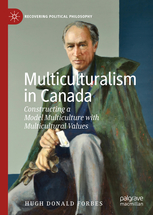
Multiculturalism in Canada: Constructing a Model Multiculture with Multicultural Values
Multiculturalism is often thought to be defined by its commitment to diversity, inclusivity, sensitivity, and tolerance, but these established values sometimes require contrary practices of homogenization, exclusion, insensitivity, and intolerance. Multiculturalism in Canada clarifies what multiculturalism is by relating it to more basic principles of equality, freedom, recognition, authenticity, and openness. Forbes places both official Canadian multiculturalism and Quebec’s semi-official interculturalism in their historical and constitutional setting, examines their relations to liberal democratic core values, and outlines a variety of practical measures that would make Canada a more open country and a better illustration of what a commitment to egalitarian cultural pluralism now means. Consisting of a series of connected essays-including careful considerations of the works of Will Kymlicka and Charles Taylor-this book provides the first comprehensive account of multiculturalism in Canada.

Absent Mandate: Strategies and Choices in Canadian Elections
Absent Mandate develops the crucial concept of policy mandates, distinguished from other interpretations of election outcomes, and addresses the disconnect between election issues and government actions. Emphasizing Canadian federal elections between 1993 and 2015, the book examines the Chretien/Martin, Harper and Trudeau governments and the campaigns that brought them to power. Using data from the Canadian Election Studies and other major surveys, Absent Mandate documents the longstanding volatility in Canadian voting behaviour. This volatility reflects the flexibility of voters’ partisan attachments, the salience of party leader images, and campaigns dominated by discussion of broad national problems and leaders rather than by coherent sets of policy proposals. The failure of elections to provide genuine policy mandates stimulates public discontent with the political process and widens the gap between the promise and the performance of Canadian democracy.
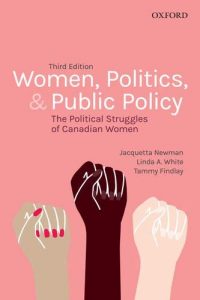
Women, Politics, and Public Policy: The Political Struggles of Canadian Women
The third edition of Women, Politics, and Public Policy examines the intersection of feminism, women’s politics, and public policy-making within a Canadian context. Thoroughly updated with current issues and research, this text is an essential tool for students to understand the many aspects of women’s political activity and its relationship to public policy and social change. Women, Politics, and Public Policy, 3e, is intended for second- and third-year courses on gender and politics, women and politics, and women and politics in Canada out of political science and women’s studies departments at universities nationwide. However, because of the multidisciplinary approach taken in the narrative, readers studying sociology, history, law, and social work may also find the text relevant.
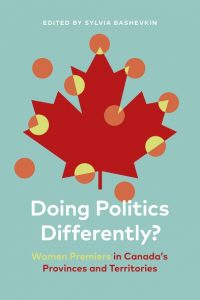
Doing Politics Differently? Women Premiers in Canada’s Provinces and Territories
Women have reached the highest levels of political office in Canada’s provinces and territories, but what difference – if any – has their rise to the top made? Have they changed the content, tone, or style of political debate? What role has gender played in their triumph and defeat?
In Doing Politics Differently? leading researchers from across the country assess the track records of eleven premiers, including their impact on policies of particular interest to women and their influence on the tenor of legislative debate and the recruitment of other women as party candidates, cabinet ministers, and senior bureaucrats.
From Catherine Callbeck in Prince Edward Island to Christy Clark in British Columbia to Eva Aariak in Nunavut, Canada stands out for the variety and number of women who have reached the top. By comparing the performance of women premiers across the country and by evaluating their records in light of the men who preceded and succeeded them, this innovative volume asks how important demographic diversity is to government decision making.
This book will appeal to both students and scholars of Canadian politics, history, and gender studies, and is an accessible read for anyone interested in women’s political and social status.
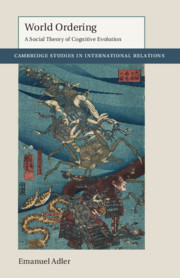
World Ordering – A Social Theory of Cognitive Evolution
Drawing on evolutionary epistemology, process ontology, and a social-cognition approach, this book suggests cognitive evolution, an evolutionary-constructivist social and normative theory of change and stability of international social orders. It argues that practices and their background knowledge survive preferentially, communities of practice serve as their vehicle, and social orders evolve. As an evolutionary theory of world ordering, which does not borrow from the natural sciences, it explains why certain configurations of practices organize and govern social orders epistemically and normatively, and why and how these configurations evolve from one social order to another. Suggesting a multiple and overlapping international social orders’ approach, the book uses three running cases of contested orders – Europe’s contemporary social order, the cyberspace order, and the corporate order – to illustrate the theory. Based on the concepts of common humanity and epistemological security, the author also submits a normative theory of better practices and of bounded progress.